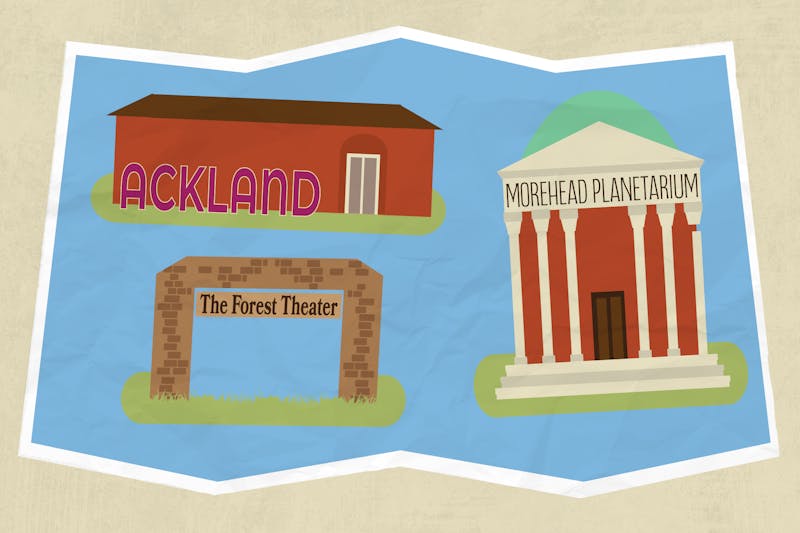You don’t have to be a student to take the “The Black and Carolina Blue” self-guided tour offered by UNC Libraries.
“This was a process of selection,” said Nicholas Graham, a university archivist who helped organize the tour, “and also a process of presenting a responsible history.”
The Black and Carolina Blue tour focuses on African-American history and takes visitors to important sites on campus that highlight this history. For example, visitors will visit the Old Chapel Hill Cemetery to learn how prominent black and white members of the university, including alumni and faculty, were buried in segregated cemeteries. They will also visit Carolina Hall, which was renamed from Sanders Hall in 2015 after 16 years of student protests. The South Building was built by 35 slaves and was another site of the civil rights movement in the 1960s.
Graham said all tours and exhibitions conducted through Wilson Library resources are open to the public and can be accessed through the library’s website.
Recently, Graham helped with a digital exhibit about Pauli Murray, a queer Black lawyer with ties to the university, as well as an exhibit about women at UNC.
Off-Campus Tours
A variety of off-campus tours are also offered, focusing on traditions, history and folklore.
The Chapel Hill/Orange County Tourism Bureau offers self-guided walking tours of murals and public art in Chapel Hill and Carrboro. Maps are free and available on their website.
The map also has interactive features, including QR codes that lead to information sites about the artists, historical figures, and mural subjects. There are about 50 murals between Chapel Hill and Carrboro.
The Marian Cheek Jackson Center also offers a self-guided tour, “Hometown History: A Walk with Northside Neighbors,” complete with downloadable audio files and maps. Community members narrate the tour, telling stories, explaining struggles, and sharing hopes for their community (the Northside neighborhood).
The audio files are free and can be accessed through the website, but listeners are encouraged to stop by the centre on West Rosemary Street to connect with staff. Physical copies of the audio and maps will also be available at the centre.
The free walking tour of Chapel Hill is a 90-minute tour guided by Sally Smith. Groups depart at Morehead Planetarium and explore historic buildings, 1960s protest sites, outdoor murals, and hidden gems of the University of North Carolina and Chapel Hill. Tours will resume in early August.
To receive the day’s news and headlines straight to your inbox every morning, sign up for our email newsletter.
For a more mystical and atmospheric nighttime exploration of Chapel Hill, Triangle Walking Tours offers the Chapel Hill Ghost Walk and the Chapel Hill True Crime Tour. Triangle Walking Tours also offers tours exploring Chapel Hill’s historic churches and architecture. All tours are $14 per hour.
The tours are organized by Andrew Nason, a University of North Carolina alumnus who also occasionally guides the tours. He says the tour development process starts with research and preparation. He then drafts a tour, runs a few tours, workshops it, and gets feedback from the community.
Nason said the workshop process helps him understand whether the stops and information he provides are important, or what can be removed to save time and effort.
“The idea is to start from there,” Nason says, “and think about what experience you believe will best convey to someone a condensed view of the history and culture of a particular city.”
Heart of the Hill Tours is a collaborative project of the Chapel Hill Historical Society and the Chapel Hill/Orange County Convention and Visitors Bureau. The program is organized by Missy Julian Fox, daughter of the original owner of the famous Franklin Street men’s clothing store, Julian’s.
Growing up in Chapel Hill, Julianne Fox was familiar with the history of the town and the university, but as she grew up, she said she realized this history was missing many perspectives. Since then, she has been committed to hosting tours that showcase that diverse history.
“Not every tour is the same and the other volunteers all have different, meaningful stories to share,” Julian Fox said.
“The beauty of this place, the tradition of Old Well, what Franklin Street means to the community,” she said, “I think all of those things make it special, not just because we’re a college town, but because of our shared history and what we stand for.”
@dthlifestyle | lifestyle@dailytarheel.com


